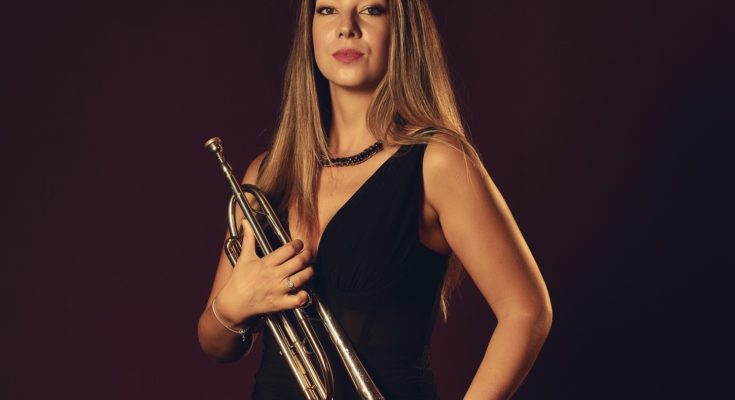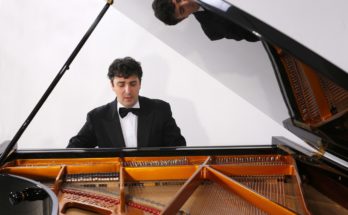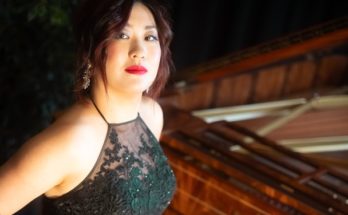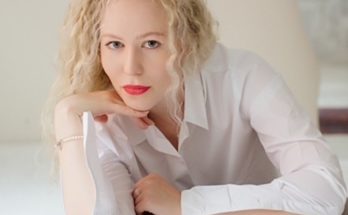PianoMe is used not only by locals, but also by international musicians. One of them is Zsófia Simon. We caught up with Zsófia to talk about why she became a trumpeter and also about her style of playing the trumpet. She also told us why she likes PianoMe’s idea.
PianoMe (PM): Dear Zsófia, thank you very much for your time! It is a great pleasure for us that you are ready for an interview with PianoMe!
Zsófia Simon (ZS): Thank you for reaching out! I appreciate the opportunity!
PM: That’s great, thank you! First of all, we would like to briefly introduce you to our readers, even though some of them probably already know who you are. You graduated from the University of Pécs and in the meantime you have developed your own style of playing trumpet. You give solo and chamber music recitals, and are actively engaged in performance activities.
ZS: When I lived in Hungary I was active in many different musical ensembles and solo too, but teaching was my main focus. Now I play in the Firdaus Orchestra which is an international all female symphony orchestra in Dubai.
PM: That sounds great! Can you please tell us first how you started getting into music, and how did you become interested in playing the trumpet?
ZS: I was 7 years old when I started learning the trumpet and I fell in love with it immediately! My parents insisted I learn music so I had to choose an instrument. I think I liked the trumpet because it had a beautiful sound and I thought I was very cool because not many girls were learning to play this instrument at that time. I remember listening to Maurice André, Sergei Nakariakov and Miles Davis a lot! I think they were the biggest influence on me as a kid!
PM: What kind of music influenced you the most?
ZS: I have listened to a lot of different music since I was a little child. I think with age the music that I listen to is constantly changing. When I was young I mostly listened to classical music and that was the biggest influence on me and on my studies at that time. After graduating from universities, I became more and more interested in other genres.
PM: And as a player, what music do you always like to return to?
ZS: After work I like practicing scales, etudes, technical stuff and classical pieces I never played before or just want to practice my older repertoire again. I’ve been rehearsing jazz improvisations in the evenings lately.
PM: Interesting! And what do you do offstage that provides inspiration on stage?
ZS: With my colleagues and friends I listen to music a lot or they recommend music they really like. Over the past few years I have been exposed to music from many different cultures. I also read music articles and books. (Nowadays I read about the best vinyl albums of all time.)
PM: Tell me, what are your feelings and emotions when you perform in front of an audience? What emotions do you feel on stage?
ZS: I am always very excited before the concert! I cannot wait to show the audience what we have learned during rehearsal. During the concert my feelings depend on the music.
PM: When talking about electronic devices, we often think about their “features”. But the trumpet is a complex device, too. What are some of its stand-out features from your point of view? How would you describe its sonic potential?
ZS: I think the possibilities offered by the trumpet are very wide. After all, we form the sound with our lips so we are responsible for every aspect of the sound we make, including all the fine details, which is both fantastic but also can be very stressful. That’s why I think the sonic possibilities are almost endless. It’s very easy to make mistakes on this instrument. The task is to find a solution to the “problem” in the shortest possible time with as few mistakes as possible while incorporating artistic ideas into the music.
PM: How would you describe your personal style of playing the trumpet?
ZS: I studied music in Hungary which has a unique trumpet school. I think the best way to describe it is that it has a characterful sound mixed with precision. This style is close to me.
PM: Interesting! Let’s change the topic a bit. Do you see any specific challenges for musicians in today’s climate? How do you mitigate those on your own?
ZS: Every musician faces different challenges every day, whether it’s their instrument, their workplace, a concrete piece or the challenges of their circumstances. The biggest challenge in my life has been as a music teacher, because teaching in Hungary at the moment is challenging in many ways. A great deal of humility and flexibility can go some way to alleviating the difficulties.
PM: Is there anything you wished you had known as a student that you know now? Any advice that you’d like to share with younger female musicians?
ZS: I had several female students. I always tried to give them advice that might have been helpful for me when I was young. Probably the best advice I can give is to always strive for the maximum and never let yourself be underestimated just because you are a woman.
PM: Thank you. Some musicians tell me that they feel that the music industry at large seems to be out of touch with what modern and contemporary jazz is, and how it is active currently. Based on this feeling, it seems like there is a need for the masses and for those working in the industry to be educated. What do you think drives this ignorance, and how can musicians and aficionados help to increase awareness and passion for jazz?
ZS: Although classical music is my area of expertise I love jazz but I’d say I’m a laywoman. Jazz is a truly unique musical genre with a specific sound world, rhythms and an important element of improvisation. Because of all this, not everyone can absorb, understand and love jazz, but still these days there is a significant audience who are happy to go to gigs and buy records. More and more people in my personal musical circles are turning to jazz too. I think it would be effective if young students could be introduced to jazz in music schools. This might also help to promote the popularity and understanding of jazz.
PM: How do you see the level of interest in jazz music in Hungary?
ZS: I think jazz is very popular in Hungary for a number of reasons. Firstly, some universities including also the Liszt Ferenc Academy of Music provide a high level of jazz education for young people. On the other hand, excellent musical ensembles, bands and performers ensure the cultivation of Hungarian jazz culture. In addition, numerous jazz festivals, institutes and jazz workshops provide opportunities for fans and jazz-loving audiences to attend performances.
PM: And what do you feel needs to be done to grow jazz music’s audiences?
ZS: I think that jazz music festivals, jazz workshops and concerts are a great opportunity for the public to get to know jazz in their country. I think it might be a good idea to include jazz or light music alongside classical music studies or at least give students the opportunity to get a broader musical perspective during their music studies.
PM: As a musician, what is your definition of success?
ZS: I think success is a completely individual experience, which every musician can experience differently. Someone can be successful in teaching, a great concert can be a successful experience, or even just a rehearsal or a productive day of practice. The most important thing to understand is that success is not the same as fame. Even the smallest things can be considered a success even if we don’t gain fame in our career.
PM: Thank you! I’m really sorry, but I have to ask (laughing). Would you recommend PianoMe to musicians?
ZS: Of course! It’s a great platform to get to know artists from different musical backgrounds! The best thing is that you also enable them to make music. Just great!
PM: Thank you! Finally, what are your aims for the future? Would you like to share any announcement with our readers?
ZS: I’m looking forward to the future to having many exciting new projects with Firdaus Orchestra. My desire is to achieve international success and to show how special and inspiring our symphony orchestra is. In everyday life my goal is to improve my skills and be better than yesterday.
PM: Dear Zsófia, we thank you for the interview and wish you all the best!
ZS: Thank you for the opportunity! I wish you all the best too!
@Photo Copyright: Zsófia Simon




